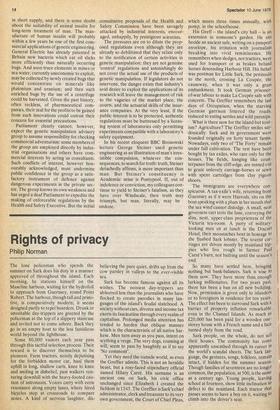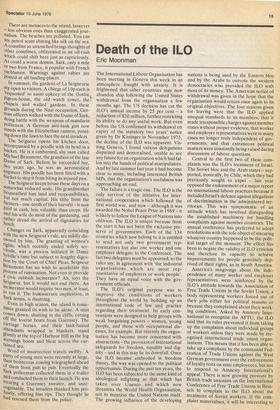Rights of privacy
Philip Norman
The lone policeman who spends the summer on Sark does his duty in a manner approved of throughout the island. Each morning, he stations himself on the Maseline harbour, waiting for the hydrofoil to approach from Guernsey, round Point Robert. The harbour, though tall and primitive, is comparatively modern; it seems designed partly to repel boarders. Drunk or unsuitable day-trippers are greeted by the policeman at the top of a slippery staircase and invited not to come ashore. Back they go in an empty boat to the less fastidious world beyond the lighthouse.
Some 80,000 visitors each year pass through this tactful selection process. Their reward is to discover themselves to be pioneers. Farm tractors, noisily deputising for the forbidden motor car, haul them uphill in long, shallow carts, knee to knee and smiling in disbelief, past walkers venturing downhill with the heavy-footed caution of astronauts. Voices carry with eerie resonance along empty lanes, where hired bicycles stop at crossroads to compare notes. A kind of nervous laughter, dis
believing the pure quiet, drifts up from the cow parsley in valleys to the ever-visible sea.
Sark has become famous against all its wishes. The noisiest day-trippers are abhorred less than the journalists who have flocked to create parodies in many languages of the island's feudal statehood. A society without cars, divorce and income tax exerts its fascination through every realm of capitalism. Prolonged media attention has tended to harden that oblique manner which is the characteristic of all native Sarkese. Men turn away as you pass, intent on scything a verge. The very dogs, roaming at will, seem to pass by haughtily as if to say 'No comment'.
Yet they need the outside world, as even the Greffier admits. This is not an heraldic beast, but a rosy-faced stipendiary official named Hilary Carre. His surname is an ancient one on Sark, his civic office unchanged since Elizabeth I created the fiefdom in 1545. The Greffier is Sark's chief administrator, clerk and treasurer to its very own government, the Court of Chief Pleas, which meets three times annually, with pomp, in the schoolhouse.
His Greff — the island's city hall — is an extension in someone's garden. He sits beside an ancient safe, writing on a passport envelope, his irritation with journalists breaking into vivid reminiscence. He remembers when sledges, not tractors, were used for transport or as brakes behind horses descending Harbour Hill. His father was postman for Little Sark, the peninsula to the north, crossing La Coupee, the causeway, when it was only a grass embankment. It took German prisoner of-war labour to make La Coup& safe with concrete. The Greffier remembers the last days of Occupation, when the starving German garrison littered the roads, reduced to eating nettles and wild parsnips.
What is there now for the island but tourism? Agriculture? The Greffier smiles sar donically. Sark and its government were founded originally on forty tenant farms. Nowadays, only two of 'The Forty' remain under full cultivation. The rest have been bought by tax exiles, who care only for the houses. The fields, hanging like cola terpanes from the cliff-edge, are rented our to graze unlovely carriage-horses or sewn with spent cartridges from clay pigeon shoots.
The immigrants are everywhere conspicuous. A tax-exile's wife, returning from Guernsey as if it were Harrods, sits on the boat speaking with a plum in her mouth that the sea wind cannot dislodge. A small, neat governess cart trots the lane, conveying the slim, neat, upper-class proprietress of the Victoria tea-room. A party of military looking men sit at lunch in the Dixcart Hotel, their moustaches bent in homage to the flushed Sark lobster. The tourist carriages are driven mostly by mainland hip ties who live rough in farmer Paul Carre's barn, not bathing until the season's end.
So many have settled here, bringing nothing but bank-balances. Sark is wise to them now. They have more than, enough lurking millionaires. For two years past, there has been a ban on all new building.
Now, permission is given only to islanders or to foreigners in residence for ten years. The effect has been to surround Sark with barrier of property inflation remarkable even in the Channel Islands. As much as £20,000 has been paid for a wooden one
storey house with a French name and a face turned shyly from the road. Sark people, on the whole, do not sall their houses. The community has come apparently unscathed through its career 01 the world's scandal sheets. The Sark Ian" guage, the gestures, songs, folklore, remain intact, if hidden for the summer season. Though families of seventeen are no longer common, the population, at 500, is the same as a century ago. Young people, leaving school at fourteen, show little inclination to defect to the mainland. Each tractor that passes seems to have a boy on it, waiting to climb into the driver's seat.
There are menaces to the island, however — less obvious ones than exaggerated journalism. The beaches are polluted. You can see petrol scum shining like silk on the sea. A coastline so untouched brings thoughts of Other coastlines, obliterated in an oil-rush Which could shift here just as capriciously. As could a worse demon. Sark, only a mile or two from France, is popular with French Yachtsmen. Warnings against rabies are Posted at all landing-places.
In summer, the gardens of La Seigneurie at; open to visitors. A charge of 10p each is 'requested' to assist upkeep of the Gothic& Pigeon-house, the old watch tower, the: Chapels and walled gardens. In these grounds during the Nazi occupation, German officers walked with the Dame of Sark, doing battle with the weapons of mandarin Politeness. A German anti-tank gun now stands with the Elizabethan cannon, pointing down the lawn to face the next invaders.
The Seigneur opens his kitchen door, accompanied by a poodle with its head in a bucket. He is a sunburned, shy man called Michael Beaumont, the grandson of the late Dame of Sark. Before he succeeded her, two years ago, he was an aeronautical engineer. His poodle has been fitted with a bucket to stop it from biting its injured paw. The Seigneur keeps house these days on a somewhat reduced scale. His grandmother bequeathed him land and responsibilities, but not much capital. His tithe from the farmers —one-tenth of their harvest — is now Paid in cash, less valuable than crops. He and his wife do most of the gardening, and rather dread the arrival of dignitaries for lunch.
Changes on Sark, apparently coinciding With the new Seigneur's rule, are mildly disowned by him. The granting of women's rights, which recently ended wifely servitude, was a process initiated in Dame Sybille's time but subject to lengthy digestion by the Court of Chief Pleas. Seigneur Beaumont has no wish to accelerate this Process of rumination. Not even to provide a civic rubbish incinerator? Ah, says the Seigneur, but it would not end there. An incinerator would require two men, at least, to run it. The bupeaucratic implication, in Sark terms, is daunting.
Even in high season, the island is sometimes granted its wish to be alone. A -mist comes down, shutting in the cliffs, cutting off the tourist boats from Guernsey. The carriage horses, and their lank-haired attendants wrapped in blankets, stand glumly at the top of Harbour Hill as the fog Warnings boom and bleat across the curtained sea.
Word of insurrection travels swiftly. A Party of young men were recently at large, their boisterous coming telegraphed ahead of them from pub to pub. Eventually the Sark policeman collected them in a trailer and conducted them to their launch. He was wearing a Guernsey sweater, and unrecognisable. The invaders thanked him profusely, offering him tips. They thought he had rescued them from the police.



































 Previous page
Previous page